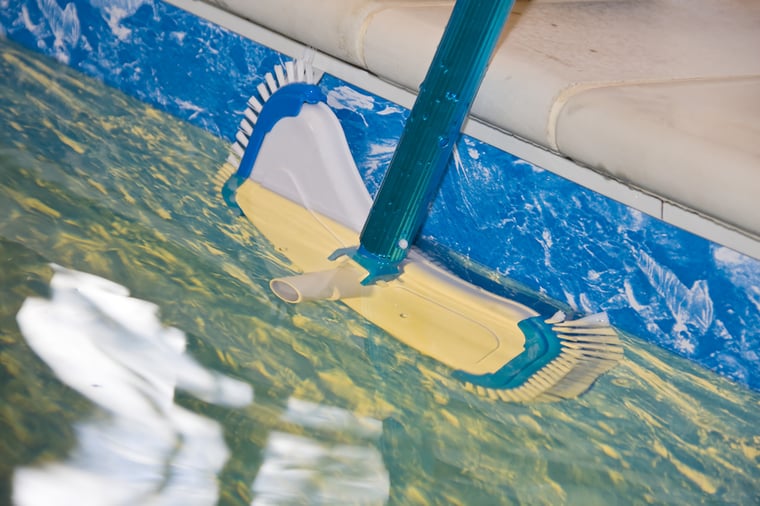
Enjoying your swimming pool for years to come is dependent on how well and regularly you clean and maintain it. While it is perfectly alright to hire a professional maintenance service, there are some pool inspection and maintenance tasks you can perform yourself.
Your home maintenance is not complete without making sure your pool is well-maintained. Just like roof repair and maintenance, it is common for homeowners to ignore the regular maintenance of their pools until it’s too late and the resulting costs become very high.
“Winterizing” your Las Vegas pool is a bit different than in colder regions that have to close down their swimming pools because they are subject to freezing outdoor temperatures. However, you still need to do some preparation to prevent motors and pumps from freezing during the off season.
After a long summer season, your pool water can have several issues. When temperatures drop below 90 degrees, you can start draining your pool if it needs an acid wash or structural work. However, depending on the age of your liner, an acid wash is not always recommended, so it’s advisable to consult a professional.
It pays to develop a basic understanding of pool and home maintenance essentials. Knowing how your pool works and the best ways to take care of it allows you to plan for its upkeep. It also helps you solve any potential problems before they escalate into big ones.
Preparing Your Pool for Winter
Intermatic Freeze Protection Control
You can prepare your pool for winter by installing an Intermatic Freeze Protection control with a Thermostat. The thermostat has a timer for providing both protection and automation for the system against freeze damage. It turns on the heater and pump whenever the outdoor temperature drops below that which you set on the user-adjustable thermostat (usually 38 degrees). This prevents the equipment from freezing
The Puripool Process
The Puripool Process is an alternative to a classic drain and refill. It involves hiring a professional service with a mobile filtration system to come and recycle the water in your pool. The filtration process also leaves your pool water balanced and ready for winter.
The Puripool Process lowers calcium hardness (CH), Cyanuric Acid (CYA), phosphates, Total Dissolved Solids (TDS), salt, viruses, bacteria, etc. leaving behind fresh, clean water. Another great benefit of this is that it’s guaranteed to preserve up to 85 percent of your existing swimming pool water.
Home Maintenance: Pool Cleaning and Upkeep
Circulation
Moving water is clearer, cleaner and safer than stagnant water, as stagnant water tends to accumulate bacteria faster. A pool with proper circulation rarely has issues such as algae infestation or cloudy water. Run your pump and filter system daily for at least a few hours.
Your pool pump does not require a lot of TLC. Just clean out its strainer basket weekly since a clogged one makes the pump work harder than necessary. Also, inspect the O-ring (a gasket sealing for your pump that prevents water leakage) for wear and lubricate it.
Don’t forget to backwash the filters to clear debris and built-up contaminants. It involves the reversal of water flow through your filter system and shunting any dirty water to the waste port. The specific method of cleaning and backwashing you use is dependent on your filter type; however, the underlying concepts are mostly similar.
Cleaning
Regular use and Mother Nature bring all sorts of dirt and debris into your pool. This is why proper pool cleaning is vital. Always vacuum, skim and brush your pool weekly when it is in high use. You can do it less often in winter. Baking soda paste is a suitable scouring cleaner that does not damage tile or vinyl liner when brushing.
Automatic pool cleaners significantly cut your cleaning time. While they won’t remove the need for regular brushing and skimming, they make both tasks easier. You can also use unorthodox cleaning methods such as tossing tennis balls into the skimmer basket or your pool so that they absorb surface oils. You can also wrap pantyhose on your skimmer baskets to create a fine filter. Use flocculant as a temporary fix for clearing cloudy pool water quickly.
Do not forget to clean out your skimmers weekly, which are the small rectangular boxes built into your pool’s sides, right at the waterline. They help catch debris and other large items preventing them from reaching the filter and pump.
Pool Chemistry
Here, your most essential tool is your water testing kit. You need to test your pool first before reaching for the chemicals. Consider the following:
- Acidity (pH) levels: “pH” (potential hydrogen) is the measure of a solution’s acidity. Low levels are acidic and high levels are basic. Your pool’s ideal range should be between 7.2 and 7.8.
- Alkalinity: It reflects the level of water substances with acid-neutralizing ability. Proper alkaline levels prevent wide fluctuations of a substance’s pH levels. Its ideal level should range from 80 to 120 parts per million (ppm).
- Sanitizer: It is the amount of chlorine or bromine in your pool water. Correct levels vary depending on the type of sanitizer you use.
A low pool pH level results in the corrosion of metal or plaster parts of your filters, pumps, heaters, etc., as the water attempts to self-correct. Whereas, a high pH level promotes the formation and deposit of scale on your pool walls, plumbing and equipment. Once you understand your pool chemistry, you can add chemicals to correct or tweak your water balance. Follow the instructions given and understand the effects of the chemicals before using them.
Don’t Forget the Shock
Add pool shock regularly to ensure that your pool stays clean. It’s best to shock your pool after a rainstorm or if you use the pool a lot. Never shock your pool during the day since the sun will disintegrate the chlorine before it does its job. It’s best to do it at night or dusk, and then run your pump for not less than eight hours to ensure full circulation.
The Bottom Line
Cleaning and maintaining your pool require effort, but it’s worth it in the end. You should come up with a home maintenance schedule to make it easy to stay organized and ensure that you do essential tasks. You will also be better prepared to plan for advanced pool maintenance tasks, such as caring for your pool during the cold winter season, preparing for fall or spring or even closing it.
A swimming pool is a welcome relief during the hot summer months in Las Vegas. By practicing some essential, simple maintenance, you can significantly maximize the life and use of your pool. If you find that DIY pool cleaning is more time consuming than you can handle, it's best to hire a professional cleaning and maintenance service.
For more home maintenance tips, here are some helpful articles:

















